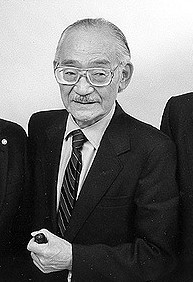Minoru Yasui | |
|---|---|
| 安井稔 | |
 | |
| Born | October 19, 1916 Hood River, Oregon, U.S. |
| Died | November 12, 1986 (aged 70) Denver, Colorado, U.S. |
| Resting place | Hood River, Oregon |
| Other names | Min |
| Occupation | Lawyer |
| Known for | Yasui v. United States |
| Spouse |
True Shibata (m. 1946) |
| Children | 3 |
| Awards | Presidential Medal of Freedom (posthumous, 2015) |
Minoru Yasui (安井稔, Yasui Minoru, October 19, 1916 – November 12, 1986) was an American lawyer from Oregon. Born in Hood River, Oregon, he earned both an undergraduate degree and his law degree at the University of Oregon. He was one of the few Japanese Americans after the bombing of Pearl Harbor who fought laws that directly targeted Japanese Americans or Japanese immigrants. His case was the first case to test the constitutionality of the curfews targeted at minority groups.
Yasui's case made its way to the United States Supreme Court, where his conviction for breaking curfew was affirmed. After internment during most of World War II, he moved to Denver, Colorado in 1944. In Denver, Yasui married and became a local leader in civic affairs, including leadership positions in the Japanese American Citizens League. In 1986, his criminal conviction was overturned by the federal court.
In 2015, Senator Mazie K. Hirono nominated Yasui for the Presidential Medal of Freedom, the highest civilian award of the United States.[1] On November 16, 2015, President Barack Obama announced that Yasui would receive a posthumous Presidential Medal of Freedom.[2] The Medal was presented to Lori Yasui in a White House ceremony on November 24, where he became the first Presidential Medal of Freedom winner from Oregon.[3]
- ^ "Hirono, Honda Praise Awarding Of Presidential Medal Of Freedom To Civil Rights Leader Minoru Yasui". hirono.senate.gov. November 16, 2015. Archived from the original on November 1, 2017. Retrieved November 17, 2015.
- ^ "President Obama Names Recipients of the Presidential Medal of Freedom". whitehouse.gov. November 16, 2015. Archived from the original on January 28, 2017. Retrieved November 16, 2015 – via National Archives.
- ^ "Salem tour supports 'Minoru Yasui Day' | Gorge Life | columbiagorgenews.com". December 16, 2023. Retrieved December 16, 2023.